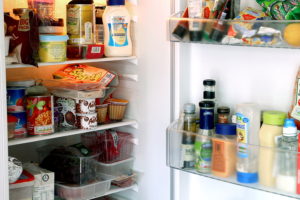A quick check of your loved one’s refrigerator can save a life.
For older adults, keeping food safety in mind when they are still living on their own is important for their health. Eating spoiled food can have serious

consequences. There are many reasons why an older person may eat spoiled food. Some seniors think discarding food is wasteful and would rather take the risk. Others are isolated and do not have easy transportation or support for regular food shopping. During the pandemic, older adults were afraid to shop frequently because of the risk of catching the coronavirus. Brookville Home Care aids can assist with shopping and cooking to make sure that your loved one is meeting their daily nutritional needs.
As we age, vision changes make it difficult to accurately read “use by” dates, or to spot small clusters of mold growing on bread and grains. It becomes harder to notice small changes in color or texture that would indicate that food should not be eaten. It may be difficult to read the temperature settings in the refrigerator, or to reach to the back to adjust them.
Decreases in smell and taste make it difficult to tell if food not fresh. Some medications can cause changes to smell and taste, making it even harder to detect spoiling food, especially in the early stages. Older people who smoke or have smoked are even more at risk because of damage to the nerves that allow smell and taste.
Once spoiled food is ingested, older adults are at higher risk for poor outcomes from food poisoning. As people age, they produce less stomach acid. This allows bacteria hidden in food to pass into the intestine. Immune systems weakened by age, medications, or other conditions allow bacteria to move more freely through the body and affect multiple areas at once. Kidney function naturally decreases with age making it more difficult for the body to filter bacteria out. These factors, combined, can create life threatening problems quickly.
To protect themselves, seniors can take many steps. Wash hands before handling food. Keep food preparation areas clean and dry. Wear glasses when preparing foods and while grocery shopping. Use additional lighting at home while inspecting food for spoilage. Check the ‘use by’ dates and discard food according to the date. When storing food, use a marker to write a discard date as a reminder. Ask family and friends to double check your food when visiting. If there is any doubt, throw it out.
